For Glory (with the Champions Expansion) offers head-to-head and solo deckbuilding in ancient Rome
Maybe I am biased here, but I often find myself thinking that confrontational card games like For Glory: Premium Edition are at their best when the experience is focused on just two players. In this head-to-head game about life and death both in and out of the arenas of ancient Rome, For Glory: Premium Edition really excels thanks to fast, tight gameplay and a surprising amount of depth.
For Glory: Premium Edition is a deckbuilding game at heart, and players will begin with a deck of fourteen cards from which they will draw a generous hand of seven. The game is split into two very different phases of play, each of which has its own turn structure and flow. The Machinations Phase represents the preparation that goes into planning the gladiatorial games, and then the Arena Phase is the actual fighting itself.
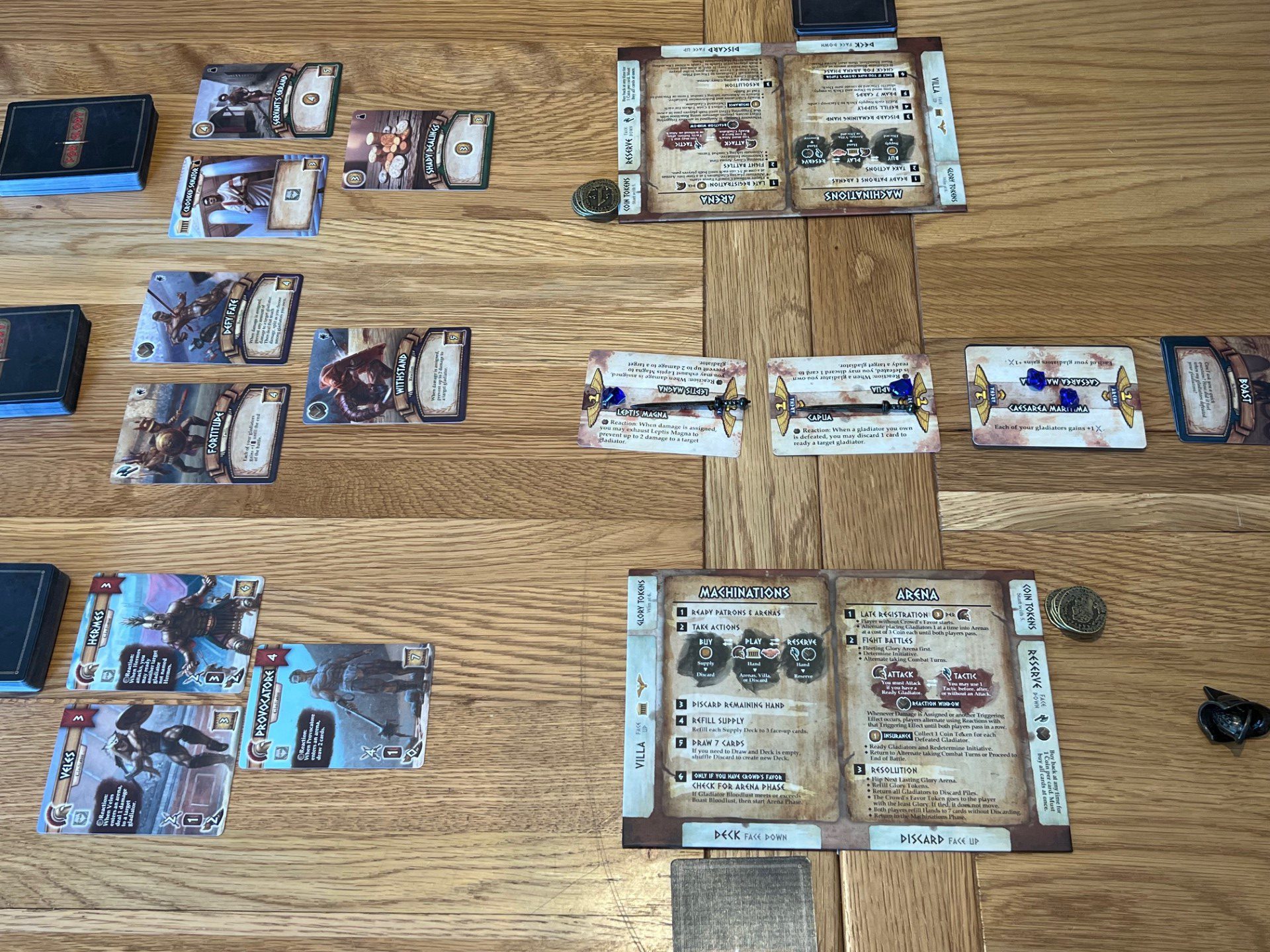
Whilst Machinations make up the bulk of the time you’ll spend with For Glory: Premium Edition, the Arena Phase is where you’ll score all your points — it really doesn’t matter how many Consul’s, Senators or Legates you bribe if your gladiators don’t do the business on the sand. Whilst most deckbuilding games force the players to switch from building an engine to executing a plan at some point, few do it quite as pointedly as For Glory: Premium Edition does.
The Machinations Phase is quite simple, with the player who has the crowd favour token (a gorgeous metal Murmillo helmet, exclusive to this upgraded edition of the game) starting off. Players can use every card in their hand if they wish, and during the first few rounds, you’ll often do just that – using your “Business As Usual” cards to generate money, your “Cull” card to remove cards you don’t want or for its alternate ability to generate extra income, or your starting gladiator cards (which are quite weak) to stake a claim to one or two of the three arenas on offer
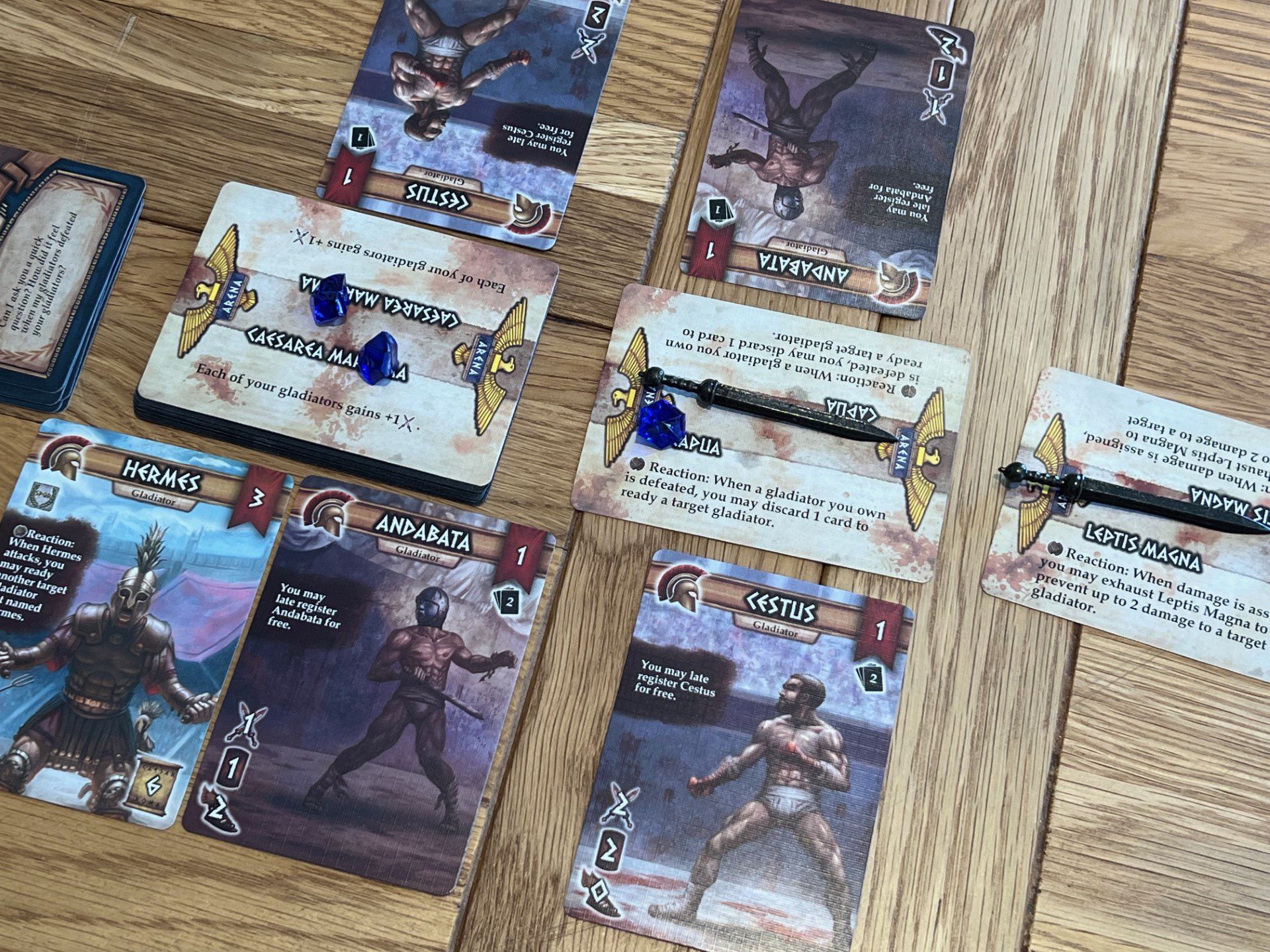
As players earn income from using these early cards, they can choose to buy new ones from one of the three markets available to them. These markets contain gladiators, economic enhancements and tactics for use in the arena, each offering exactly three cards. As most of you will know, a market is pretty much essential in deck-building games, but three markets sorted by card type tells me that developer Spielcraft Games is seeking to ensure that luck of the draw is minimised.
This is also demonstrated by another starting card — called Fresh Perspective — which allows players to clear a market completely or to take a single coin token. I don’t want to overstate what is happening with the three markets and this crucial card, but I just want to reiterate the point that For Glory: Premium Edition is a truly competitive gamers game. There are many other facets where luck is reduced in favour of player agency, and whilst that can lead to more complexity for newcomers, to me, it makes For Glory: Premium Edition all the more interesting.
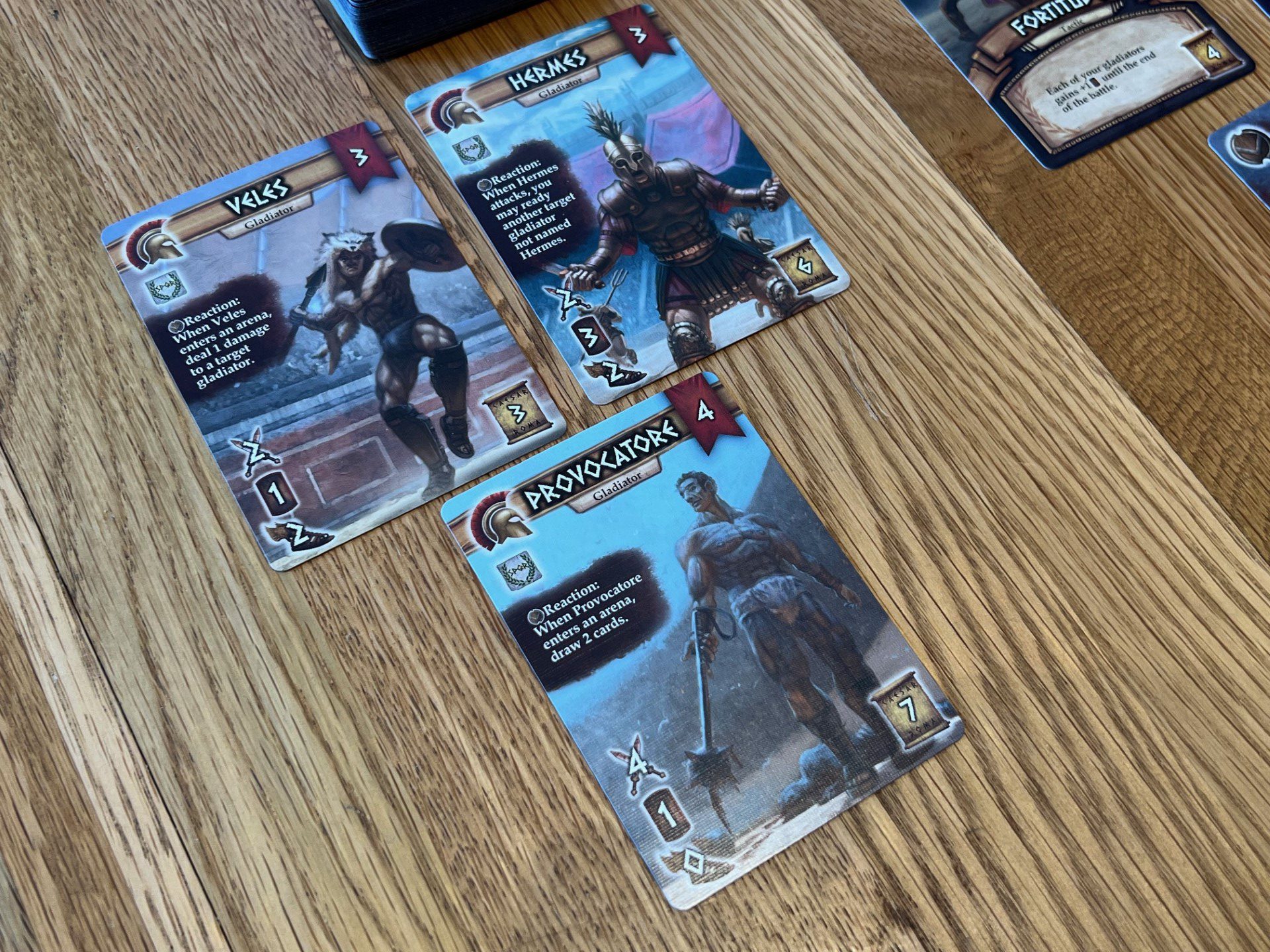
In any case, when you buy a new card, it goes into your discard along with any cards you played. When you eventually run out of cards to draw from, you’ll shuffle your entire discard (with any cards added to it) and then draw seven more. In this way, players spend coins, add new cards to their deck, play gladiators into the two active arenas (there are always three, but only two can be competed in per Arena phase) and expand their villa with various support cards – some of whom affect gladiator performance, cost or tactics, whilst others simply add their influence (which is needed to deploy more powerful gladiators).
At some point, the total bloodlust of all gladiators (as shown in the top right corner) will meet or exceed the boast value of the current round card. This begins quite low (at four) but by later rounds you’ll need four, five or more powerful gladiators to trigger it, and again, player agency is the focus here. The players jointly determine when the Arena Phase occurs by playing enough power to trigger it — and the players can choose whether to focus on one arena or both, spreading their fighters as they see fit.
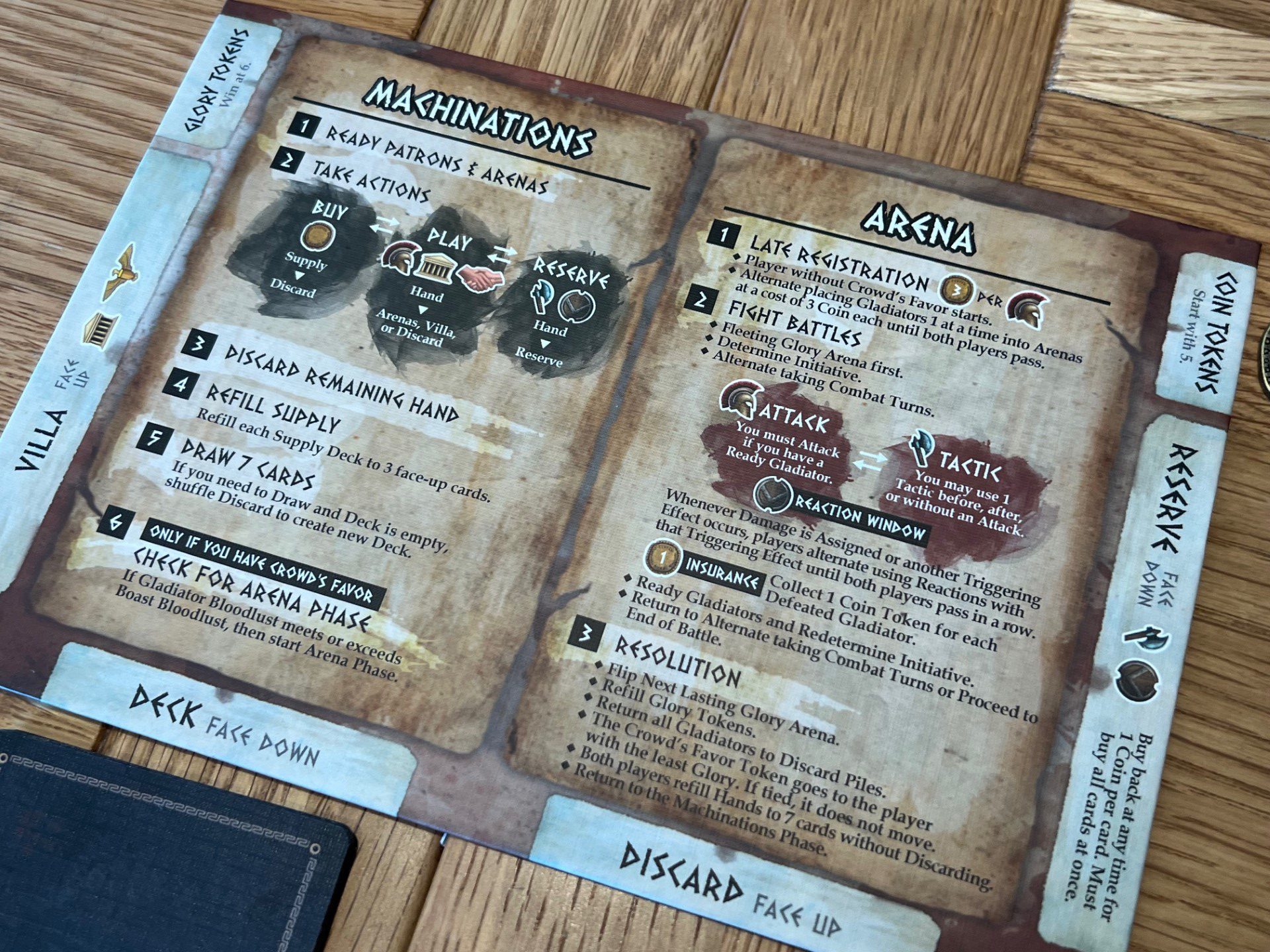
When the Arena Phase begins, the players choose one arena to resolve and then take turns to tap their gladiators and strike at the other side. The highest initiative will act first, and if a strike lands that will kill an opposing gladiator before they retaliate, then so be it. However, each player has a chance to react after an attack is declared, and tactic cards can change the outcome of an attack (and a whole skirmish) massively.
There are other things to consider too, like Late Entrants — where a gladiator is added to an arena before any battle resolution at the start of the Arena Phase — potentially surprising their opponent. Some gladiators and supporting cards have abilities that affect battle too, perhaps changing the initiative order or adding extra health to the gladiators they (thematically) have been training. When a player wins in an arena, they will also gain either a temporary or lasting benefit from it, which again will affect the outcome of future battles.
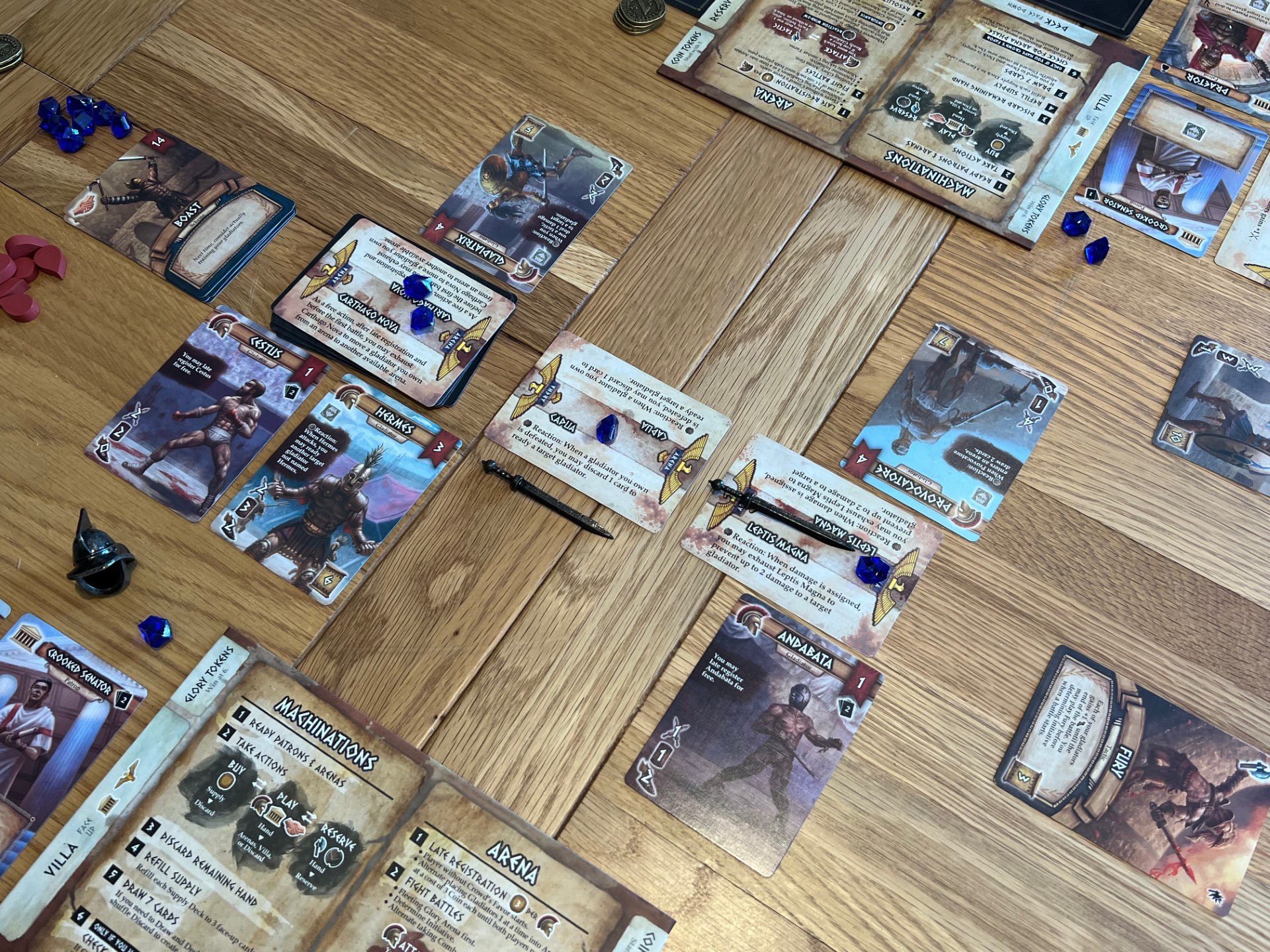
After all conflicts are finished, all gladiators return to their owner’s discard piles to fight again later, and whilst glory awaits those who win (with amassing six glory being the victory condition) the loser will still gain a coin for each defeated gladiator (in insurance money.) The overall winner of each Arena Phase also takes the boast card for that round – and this is a useless card that just clogs up a space in their hand when drawn (remember that Cull card that I mentioned?).
Again, this is just very clever, thematic design. You may have seen the TV Show Spartacus or perhaps read about Roman life, and if you have, you’ll know that people who ran Ludus schools loved to boast – and did it ever really help them? Of course not. The small incremental benefits for winning in an arena are also nice, but so too is the coin the loser gets when a gladiator is defeated — and for a game with so many moving parts, For Glory: Premium Edition remains very well balanced. Yes, winning is undoubtedly better, but losing isn’t the end of the world and you can come back from it.
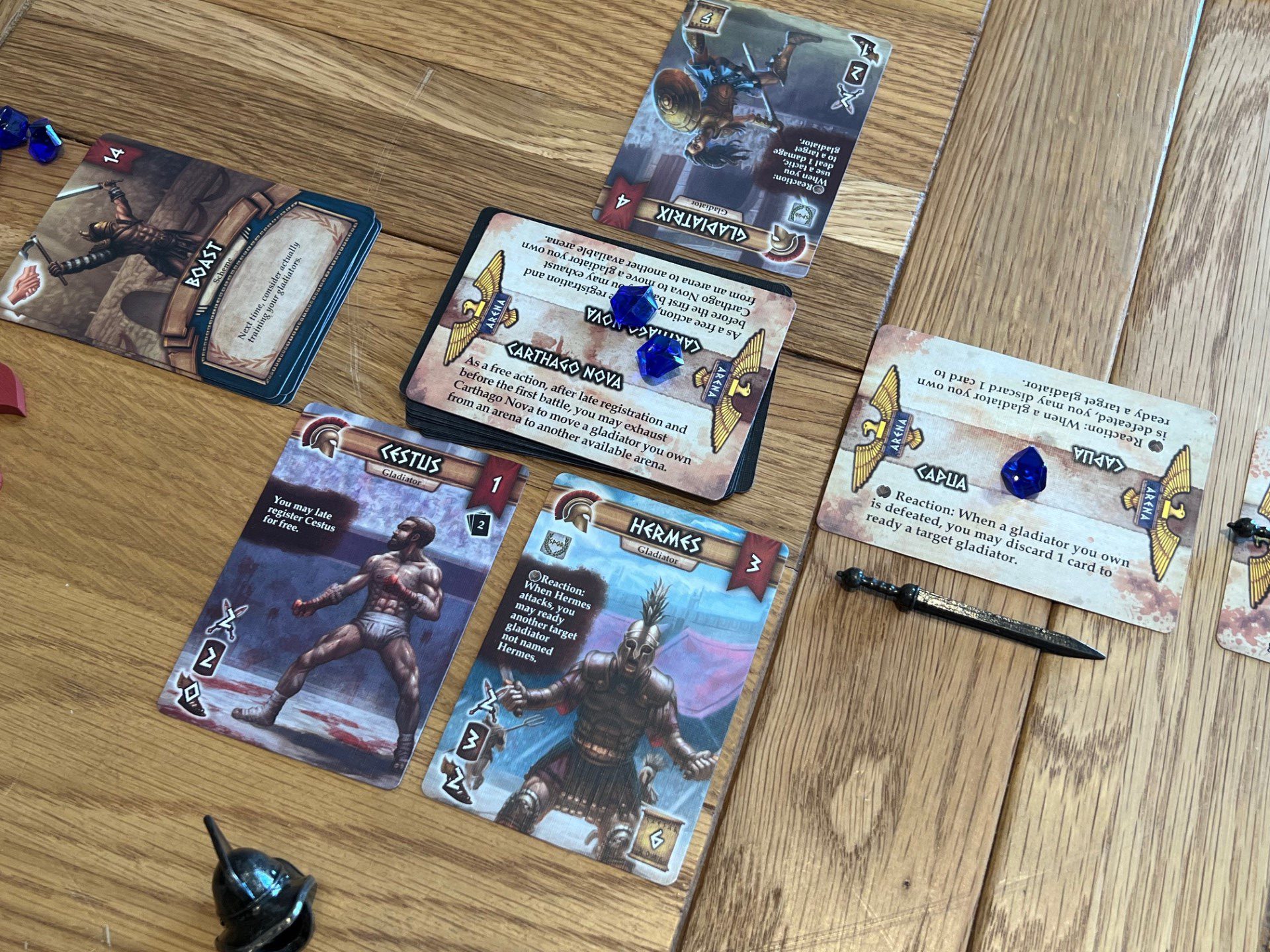
Champions Expansion
The Champions Expansion for For Glory deepens the gladiatorial deck-building experience with a host of new strategic layers. Central to the expansion are upgradeable Champion cards, which allow players to develop their gladiators over time, adding a sense of progression and personalization to each match. The introduction of Blessings, represented by wooden tokens, offers a new defensive mechanic that protects key fighters, while hybrid cards bring added versatility to deck construction, enabling more dynamic and flexible tactics.
Perhaps the most exciting addition in Champions is the solo mode, where players face off against the Ludus Magnus, a powerful AI opponent. With over 100 dedicated solo cards, this mode offers a robust and challenging experience that retains the tension and tactical depth of multiplayer play. The expansion also includes new supply and boast cards, player boards (allowing for up to 4 players), more coins and a rules addendum, making it a comprehensive upgrade that enhances both competitive and solo gameplay. Champions transforms For Glory into a richer, more customizable arena of strategy and combat – especially if you want to play either solo or with more players.
Add the lovely components of For Glory: Premium Edition to this excellent gameplay and you have for me quite a winning formula. Games can be slightly overlong, often reaching in excess of an hour before someone reaches the necessary six glory, but anyone who has an interest in tense, two player games and ancient Rome as a theme will be loving every minute, so it hardly matters.
You can find For Glory: Premium Edition on Amazon.
Love board games? Check out our list of the top board games we’ve reviewed.
Comments are closed.